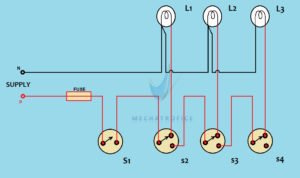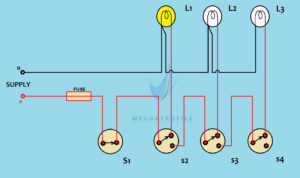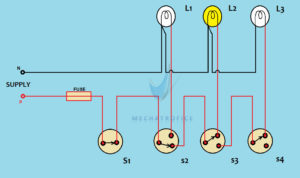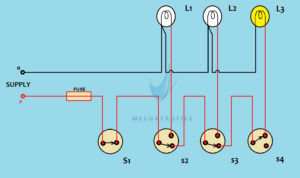Godown wiring circuit diagram and working
Godown wiring uses to operate lamps/loads in a sequential manner, where only one load operates at a time. As its name implies ” Godown wiring “, it is commonly used for light switching in godowns, tunnel-like structures, long passages.. etc, where the light is only required for passage or it requires only at one position at a time. The advantage of the godown wiring is the previous load will be turned off when we normally switch ON the next load.




In godown wiring, the loads are not controlled by a random switching. The user should follow a linear sequence in the switching, from one end to another. That is, to close the circuit for a final load the remaining switches should be ON. That is the load is in series with remaining switches from the beginning end. So the circuit opens if any of the previous switches have flipped OFF.
Godown wiring circuit arrangement
The phase has connected to the common pole of the first switch. The 1st throw of the switch has connected to load. And the 2nd throw has connected to the common pole of the next switch. Initially, common poles of all the switches are positioned to the 1st throw of the SPDT switch. So in such an arrangement, changing the switch position to 2nd throw OFF’s previous load and ON the next one. By this arrangement, an infinite number of loads can be connected in a sequence.
Switch S1 in the circuit is SPST and remaining are SPDT (Refer: electrical abbreviations and full forms), also called as a changeover switch. In godown wiring, the loads and switches are generally connected with equal spacing. The gauge of wire or the load capacity of the wiring should be considered based on the power rating and the number of loads. If the power rating of all the loads is same, the ideal power consumption will be constant. Because even though the circuit has a number of loads only one load will be ON at a time. So, the number of loads makes a change only on the length of wiring and the overall wire resistance. That is the copper loss or the heat loss in the wiring.
Components Required
| Component | specification | Quantity |
| MCB | 250V , 50Hz , 5A | 1 |
| Switch | SPDT , 250V , 5A | 3 |
| Switch | SPST, 250V, 5A | 1 |
| Lamp | 230V | 3 |
Superb…..
good
nice